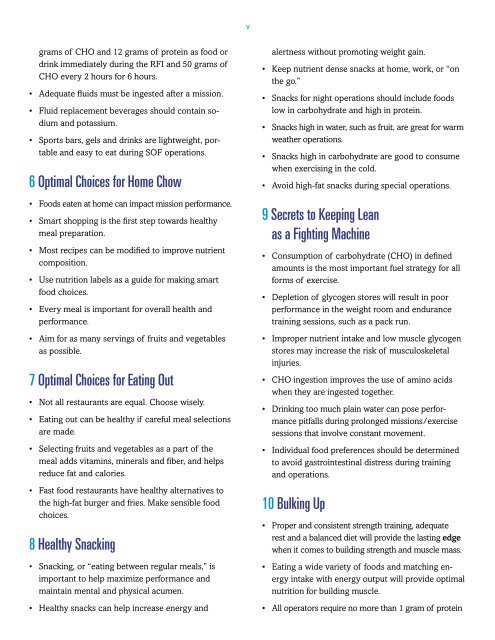special-operations-nutrition-guide
special-operations-nutrition-guide
special-operations-nutrition-guide
You also want an ePaper? Increase the reach of your titles
YUMPU automatically turns print PDFs into web optimized ePapers that Google loves.
v<br />
grams of CHO and 12 grams of protein as food or<br />
drink immediately during the RFI and 50 grams of<br />
CHO every 2 hours for 6 hours.<br />
• Adequate fluids must be ingested after a mission.<br />
• Fluid replacement beverages should contain sodium<br />
and potassium.<br />
• Sports bars, gels and drinks are lightweight, portable<br />
and easy to eat during SOF <strong>operations</strong>.<br />
6 Optimal Choices for Home Chow<br />
• Foods eaten at home can impact mission performance.<br />
• Smart shopping is the first step towards healthy<br />
meal preparation.<br />
• Most recipes can be modified to improve nutrient<br />
composition.<br />
• Use <strong>nutrition</strong> labels as a <strong>guide</strong> for making smart<br />
food choices.<br />
• Every meal is important for overall health and<br />
performance.<br />
• Aim for as many servings of fruits and vegetables<br />
as possible.<br />
7 Optimal Choices for Eating Out<br />
• Not all restaurants are equal. Choose wisely.<br />
• Eating out can be healthy if careful meal selections<br />
are made.<br />
• Selecting fruits and vegetables as a part of the<br />
meal adds vitamins, minerals and fiber, and helps<br />
reduce fat and calories.<br />
• Fast food restaurants have healthy alternatives to<br />
the high-fat burger and fries. Make sensible food<br />
choices.<br />
8 Healthy Snacking<br />
• Snacking, or “eating between regular meals,” is<br />
important to help maximize performance and<br />
maintain mental and physical acumen.<br />
• Healthy snacks can help increase energy and<br />
alertness without promoting weight gain.<br />
• Keep nutrient dense snacks at home, work, or “on<br />
the go.”<br />
• Snacks for night <strong>operations</strong> should include foods<br />
low in carbohydrate and high in protein.<br />
• Snacks high in water, such as fruit, are great for warm<br />
weather <strong>operations</strong>.<br />
• Snacks high in carbohydrate are good to consume<br />
when exercising in the cold.<br />
• Avoid high-fat snacks during <strong>special</strong> <strong>operations</strong>.<br />
9 Secrets to Keeping Lean<br />
as a Fighting Machine<br />
• Consumption of carbohydrate (CHO) in defined<br />
amounts is the most important fuel strategy for all<br />
forms of exercise.<br />
• Depletion of glycogen stores will result in poor<br />
performance in the weight room and endurance<br />
training sessions, such as a pack run.<br />
• Improper nutrient intake and low muscle glycogen<br />
stores may increase the risk of musculoskeletal<br />
injuries.<br />
• CHO ingestion improves the use of amino acids<br />
when they are ingested together.<br />
• Drinking too much plain water can pose performance<br />
pitfalls during prolonged missions/exercise<br />
sessions that involve constant movement.<br />
• Individual food preferences should be determined<br />
to avoid gastrointestinal distress during training<br />
and <strong>operations</strong>.<br />
10 Bulking Up<br />
• Proper and consistent strength training, adequate<br />
rest and a balanced diet will provide the lasting edge<br />
when it comes to building strength and muscle mass.<br />
• Eating a wide variety of foods and matching energy<br />
intake with energy output will provide optimal<br />
<strong>nutrition</strong> for building muscle.<br />
• All operators require no more than 1 gram of protein


